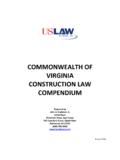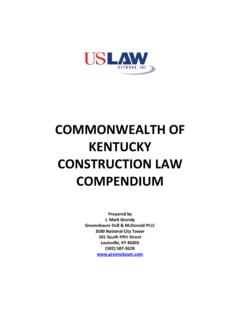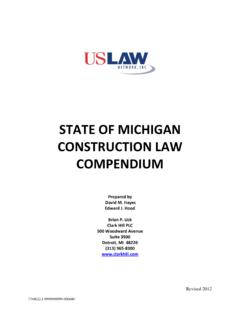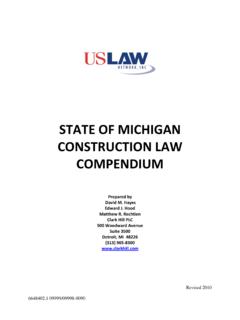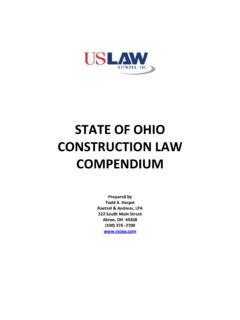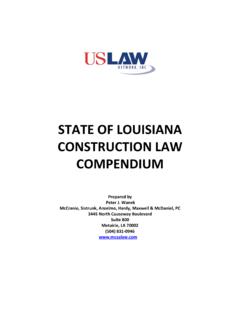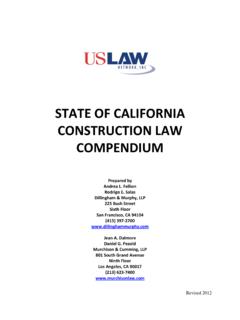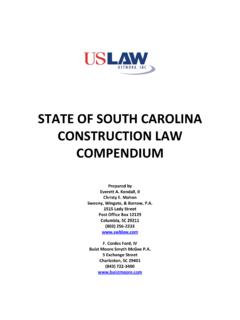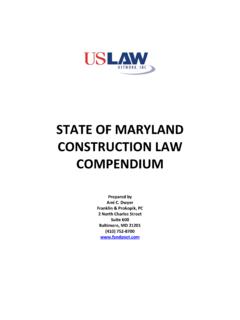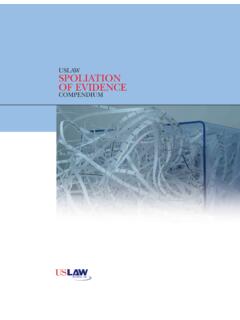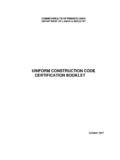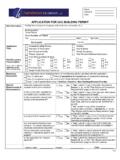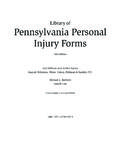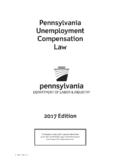Transcription of COMMONWEALTH OF PENNSYLVANIA …
1 COMMONWEALTH OF PENNSYLVANIA construction LAW COMPENDIUM Prepared by J. Michael Kunsch Sweeney & Sheehan, 1515 Market Street, 19th Floor Philadelphia, PENNSYLVANIA 19102 (215) 563 9811 Daniel L. Grill and Corey J. Adamson Thomas, Thomas & Hafer LLP 305 N. Front Street, 6th Floor Harrisburg, PA 17101 (717) 237 7100 Joseph J. Bosick Pietragallo Gordon Alfano Bosick & Raspanti, LLP One Oxford Center, 38th Floor Pittsburgh, PA 15219 (412) 263 2000 The following synopsis of construction law in the COMMONWEALTH of PENNSYLVANIA is designed as an overview of basic legal principles and for use as a research tool.
2 It is not meant to be a comprehensive summary of relevant law, nor is it to be interpreted as providing legal advice to the reader. I. BREACH OF CONTRACT In PENNSYLVANIA , as elsewhere, agreements for the construction of a home, public utilities, private commercial structures, excavation, sewers, roadways and the like are typically memorialized in a contract between the purchaser and the builder. PENNSYLVANIA contract law encompasses general, basic rules of contract construction . Contracts in PENNSYLVANIA are also subject to the statute of frauds. The general rule in PENNSYLVANIA is that the provisions of UCC Article 2 do not apply to contracts for the construction of residential homes and commercial real estate, in that they are not contracts for the sale of "goods.
3 " DeMatteo v. White, 336 355 (Pa. Super. 1975). See Gustine Uniontown Associates, Ltd. ex rel. Gustine Uniontown, Inc. v. Anthony Crane Rental, Inc., 892 830 (Pa. Super. 2006). Ordinarily, the specifications of a construction contract will clearly denote the "kinds, quality, and quantity of work to be done, the details, time and manner of construction , without which the contract would be incomplete and ineffective." Z & L Lumber Co. of Atlasburg v. Nordquist, 502 697, 701 (Pa. Super. 1985); see also Knelly v. Horwath, 57 A.
4 957 (Pa. 1904). A violation of one of these numerous provisions could give rise to a breach of contract action against the builder because when performance under a contract is due, any nonperformance is a breach. Widemer Eng g, Inc. v. Dufalla, 837 459, 468 (Pa. Super. 2003); See also Restatement (Second) of Contracts 235(2) (1981). If a breach constitutes a material failure of performance, then the non-breaching party is discharged from all liability under the contract. Id. In considering whether a failure of performance is material, the following factors are considered: a) the extent to which the injured party will be deprived of the benefit which he reasonably expected; b) the extent to which the injured party can be adequately compensated for that part of that benefit of which he will be deprived; c) the extent to which the party failing to perform or to offer to perform will suffer forfeiture.
5 D) the likelihood that the party failing to perform or offer to perform will cure his failure, taking into account all the circumstances including any reasonable assurances; e) the extent to which the behavior of the party failing to perform or offer to perform comports with standards of good faith and fair dealing. 2 Id. at 469; Restatement (Second) of Contracts 241 (1981). An anticipatory breach occurs whenever there has been a definite and unconditional repudiation of a contract by one party communicated to another. A statement by a party that he will not or cannot perform in accordance with agreement creates such a breach.
6 Oak Ridge construction Co. v. Tolley, 504 1343 (Pa. Super. 1985); see also Corbin on Contracts 959 (1993); Restatement (Second) of Contracts 250 (1981). When a party to a contract seeks to enforce the agreement or to recover damages for breach of the agreement, that party must prove that he has performed all of his own obligations under the contract. See Trumbull Corp. v. Boss construction , Inc., 801 1289 (Pa. Commw. 2002). Breach of contract actions are also often accompanied by other causes of action. II. NEGLIGENCE Typically, defective construction cases include negligence claims.
7 Such cases include allegations that, inter alia, the builder breached the duties of reasonable care, reasonable workmanship and/or violated any of the various obligations imposed by law. See Section III, infra. However, tort claims may be barred by the economic loss doctrine or the gist of the action doctrine. See Sections VIII and IX, infra. The waiver of subrogation clause contained in a standard American Institute of Architects (AIA) agreement precludes negligence and breach of contracts claims. Universal Underwriters Ins. Co. v. A. Richard Kacin, Inc., 916 686 (Pa.)
8 Super. 2007). After the insurer paid its insured car dealership for damage resulting from the collapse of a wall, the insured brought a subrogation action against the general contractor and subcontractor, alleging negligent construction . The insurer argued that the waiver of subrogation clause could not be enforced against it because it was not a party to the agreement and did not receive notice or give its consent. In ruling on this issue of first impression, the Superior Court rejected the insurer s contention that notice or consent was required to enforce the provision, stating that in PENNSYLVANIA , a subrogee essentially stands in the shoes of its subrogor.
9 Id. at 693. The Superior Court also rejected the insurer s arguments that the waiver of subrogation provision conflicted with other contract provisions, including the warranty that the work would be of good quality and free from defect. Id. at 692-693. The Court stated those other provisions could be read as providing a contractual remedy only where alleged damages were not covered by the property insurance obtained pursuant to the contract. The Court further rejected the argument that the waiver of subrogation provision operated to transfer liability for negligence away from the general contractor or subcontractor.
10 The Court stated that the party obtaining insurance coverage to pay claims for which he is liable does not transfer liability away from himself to the other party to the clause in question, but satisfies his debt to that party. Id. at 693. The Court explained that through the waiver of subrogation clause, the owner and contractors agreed to share the burden of either party s negligence by requiring the purchase of property insurance covering the construction work and by agreeing not to sue each other for damages covered by that insurance.
